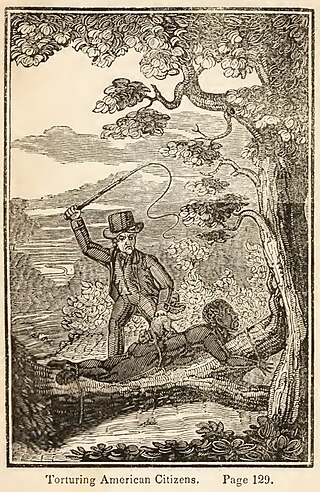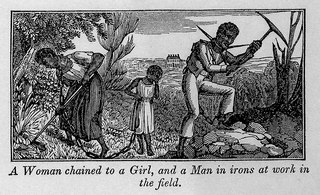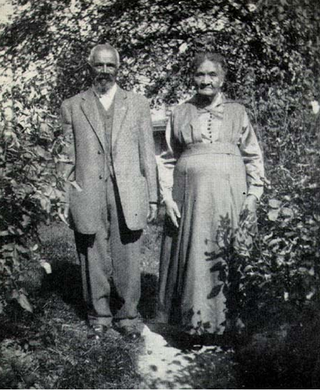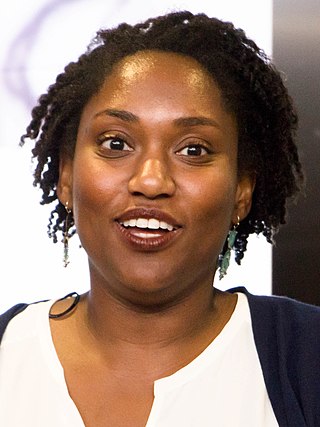Related Research Articles

The Emancipation Proclamation, officially Proclamation 95, was a presidential proclamation and executive order issued by United States President Abraham Lincoln on January 1, 1863, during the American Civil War. The Proclamation had the effect of changing the legal status of more than 3.5 million enslaved African Americans in the secessionist Confederate states from enslaved to free. As soon as slaves escaped the control of their enslavers, either by fleeing to Union lines or through the advance of federal troops, they were permanently free. In addition, the Proclamation allowed for former slaves to "be received into the armed service of the United States". The Emancipation Proclamation played a significant part in the end of slavery in the United States.

The legal institution of human chattel slavery, comprising the enslavement primarily of Africans and African Americans, was prevalent in the United States of America from its founding in 1776 until 1865, predominantly in the South. Slavery was established throughout European colonization in the Americas. From 1526, during the early colonial period, it was practiced in what became Britain's colonies, including the Thirteen Colonies that formed the United States. Under the law, an enslaved person was treated as property that could be bought, sold, or given away. Slavery lasted in about half of U.S. states until abolition in 1865, and issues concerning slavery seeped into every aspect of national politics, economics, and social custom. In the decades after the end of Reconstruction in 1877, many of slavery's economic and social functions were continued through segregation, sharecropping, and convict leasing.

African-American history started with the arrival of Africans to North America in the 16th and 17th centuries. Former Spanish slaves who had been freed by Francis Drake arrived aboard the Golden Hind at New Albion in California in 1579. The European colonization of the Americas, and the resulting Atlantic slave trade, led to a large-scale transportation of enslaved Africans across the Atlantic; of the roughly 10–12 million Africans who were sold by the Barbary slave trade, either to European slavery or to servitude in the Americas, approximately 388,000 landed in North America. After arriving in various European colonies in North America, the enslaved Africans were sold to white colonists, primarily to work on cash crop plantations. A group of enslaved Africans arrived in the English Virginia Colony in 1619, marking the beginning of slavery in the colonial history of the United States; by 1776, roughly 20% of the British North American population was of African descent, both free and enslaved.
David Montgomery was a Farnam Professor of History at Yale University. Montgomery was considered one of the foremost academics specializing in United States labor history and wrote extensively on the subject. He is credited, along with David Brody and Herbert Gutman, with founding the field of "new labor history" in the U.S.
Leon Frank Litwack was an American historian whose scholarship focused on slavery, the Reconstruction Era of the United States, and its aftermath into the 20th century. He won a National Book Award, the Pulitzer Prize for History, and the Francis Parkman Prize for his 1979 book Been In the Storm So Long: The Aftermath of Slavery. He also received a Guggenheim Fellowship.

David William Blight is the Sterling Professor of History, of African American Studies, and of American Studies and Director of the Gilder Lehrman Center for the Study of Slavery, Resistance, and Abolition at Yale University. Previously, Blight was a professor of History at Amherst College, where he taught for 13 years. He has won several awards, including the Bancroft Prize and Frederick Douglass Prize for Race and Reunion: The Civil War in American Memory, and the Pulitzer Prize and Lincoln Prize for Frederick Douglass: Prophet of Freedom. In 2021, he was elected to the American Philosophical Society.

Barbara Jeanne Fields is an American historian. She is a professor of American history at Columbia University. Her focus is on the history of the American South, 19th century social history, and the transition to capitalism in the United States.

Catharine Drew Gilpin Faust is an American historian who served as the 28th president of Harvard University, the first woman in that role. She was Harvard's first president since 1672 without an undergraduate or graduate degree from Harvard and the first to have been raised in the South. Faust is also the founding dean of the Radcliffe Institute for Advanced Study. She has been ranked among the world's most powerful women by Forbes, including as the 33rd most powerful in 2014.

Allen Carl Guelzo is an American historian who serves as the Thomas W. Smith Distinguished Research Scholar and Director of the Initiative on Politics and Statesmanship in the James Madison Program at Princeton University. He formerly was a professor of History at Gettysburg College.

African Americans, including former enslaved individuals, served in the American Civil War. The 186,097 black men who joined the Union Army included 7,122 officers and 178,975 enlisted soldiers. Approximately 20,000 black sailors served in the Union Navy and formed a large percentage of many ships' crews. Later in the war, many regiments were recruited and organized as the United States Colored Troops, which reinforced the Northern forces substantially during the conflict's last two years. Both Northern Free Negro and Southern runaway slaves joined the fight. Throughout the course of the war, black soldiers served in forty major battles and hundreds of more minor skirmishes; sixteen African Americans received the Medal of Honor.

Jill Lepore is an American historian and journalist. She is the David Woods Kemper '41 Professor of American History at Harvard University and a staff writer at The New Yorker, where she has contributed since 2005. She writes about American history, law, literature, and politics.

Peter Bruner was born a slave in Kentucky. He escaped enslavement to join the Union Army during the Civil War. After the war, he married and raised a family in Ohio. Collaborating with his daughter, he published his autobiography.

Slavery played the central role during the American Civil War. The primary catalyst for secession was slavery, especially Southern political leaders' resistance to attempts by Northern antislavery political forces to block the expansion of slavery into the western territories. Slave life went through great changes, as the South saw Union Armies take control of broad areas of land. During and before the war, enslaved people played an active role in their own emancipation, and thousands of enslaved people escaped from bondage during the war.

The treatment of slaves in the United States often included sexual abuse and rape, the denial of education, and punishments like whippings. Families were often split up by the sale of one or more members, usually never to see or hear of each other again.
Manisha Sinha is an Indian-born American historian, and the Draper Chair in American History at the University of Connecticut. She is the author of The Slave's Cause: A History of Abolition (2016), which won the Frederick Douglass Book Prize.
Tera Hunter is an American scholar of African-American history and gender. She holds the Edwards Professor of American History Endowed Chair at Princeton University. She specializes in the study of gender, race, and labor in the history of the Southern United States.
Stephanie E. Jones-Rogers is an American historian. She is an associate professor of history at the University of California, Berkeley, and the author of They Were Her Property: White Women as Slave Owners in the American South. She is an expert in African-American history, the history of American slavery, and women's and gender history.
Martha S. Jones is an American historian and legal scholar. She is the Society of Black Alumni Presidential Professor and Professor of History at Johns Hopkins University. She studies the legal and cultural history of the United States, with a particular focus on how Black Americans have shaped the history of American democracy. She has published books on the voting rights of African American women, the debates about women's rights among Black Americans in the early United States, and the development of birthright citizenship in the United States as promoted by African Americans in Baltimore before the Civil War.

Amy Elizabeth Murrell Taylor is an American historian. She is the T. Marshall Hahn Jr. Professor of History at the University of Kentucky.

Marcia Chatelain is an American academic who serves as the Penn Presidential Compact Professor of Africana Studies at the University of Pennsylvania. In 2021, she was awarded the Pulitzer Prize for History for her book Franchise: The Golden Arches in Black America (2020), for which she also won the James Beard Award for Writing in 2022. Chatelain was the first black woman to win the latter award.
References
- ↑ Manning, Chandra (2007). What This Cruel War Was Over. Alfred A. Knopf. ISBN 9780307264824.
- ↑ Manning, Chandra (2007). What This Cruel War Was Over. Alfred A. Knopf. ISBN 9780307264824.
- ↑ Manning, Chandra (2016). Troubled Refuge: Struggling for Freedom in the Civil War. Alfred A. Knopf. ISBN 9780307271204.
- ↑ Green, Micheal (July 21, 2007). "What This Cruel War Was Over: Soldiers, Slavery, and the Civil War (review)". Chicago Tribune.
- ↑ Smith, Mark (2016-08-26). "A Chaotic Birth of Freedom". Wall Street Journal. ISSN 0099-9660 . Retrieved 2017-08-29.
- ↑ "The OAH Distinguished Lectureship Program: Chandra Manning". OAH.org. Retrieved 22 September 2014.